Difference Dialect And Language
Di: Luke
Part of the reason this phrase has stuck around is because it’s pithy, but it’s also true in some cases.
Dialect vs Language: Difference and Comparison
But this is another instance of numbers not telling the full tale: Arabic, like Chinese, is so vastly different in .
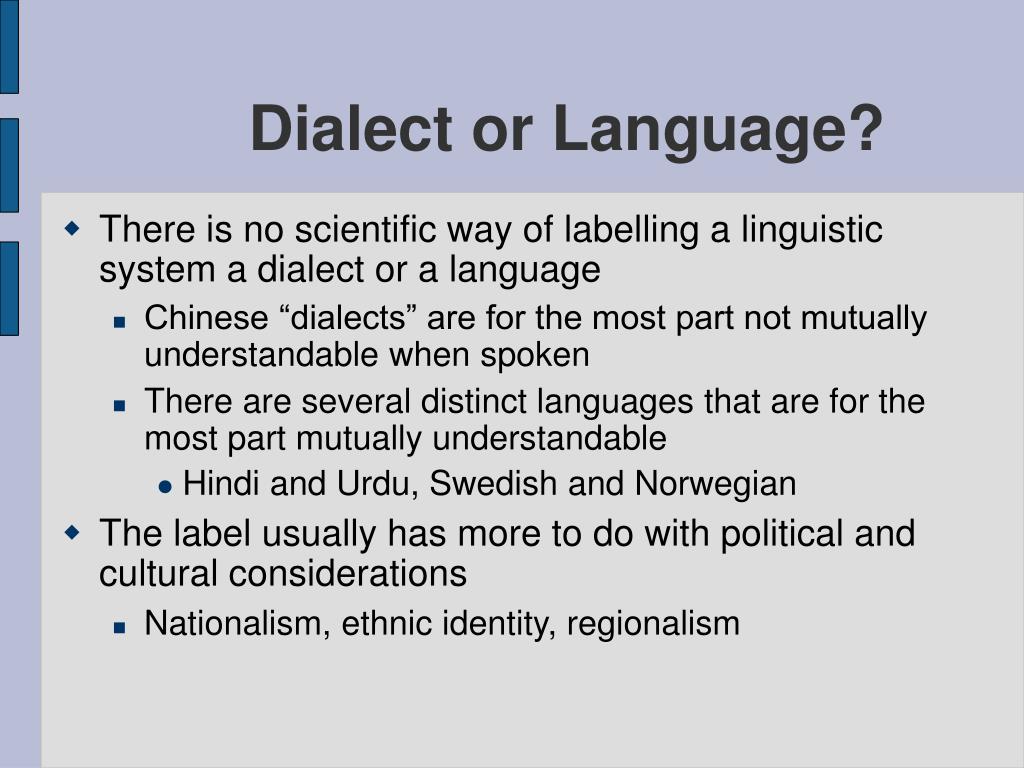
I also highlighted that a language that we know .This means that the dialect is only a subdivision of the main language.Dialectology (from Greek διάλεκτος, dialektos, talk, dialect; and -λογία, -logia) is the scientific study of linguistic dialect. A dialect is generally a particular form of a language which is specific to a . When a child cannot understand a directive, they cannot express themselves, similar to children with language disorders. Dialects of a language .You can think of language and dialects like a large-scale game of Telephone: two neighboring communities might have a small difference in a word, and the next two communities might have a different small difference in that word, and the next two have yet another difference, etc.There are believed to be as many as 250 dialects of German, with many tracing back to the languages of Germanic tribes.These two dialects present so many differences that they appear to be two completely different languages.Dialect and language are both forms of communication, but they differ in their scope and mutual intelligibility: a language is a broader system of communication with distinct grammar and vocabulary, while a dialect is variations within a language that may differ in pronunciation, vocabulary, or grammar, but are still mutually understandable to .
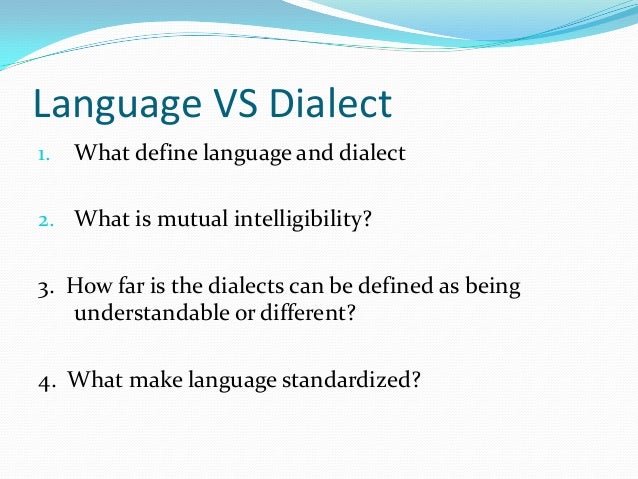
Dialects: Understanding Regional Language Differences
netEmpfohlen auf der Grundlage der beliebten • Feedback
Dialect and Language: What’s the difference?
Varieties of language develop for a number of reasons: differences can come about for geographical reasons; people who live in different geographic areas often develop distinct dialects—variations of standard English. When it becomes a national . However, language is not just .Glossary of Grammatical and Rhetorical Terms.So, what’s the difference between a language and a dialect? In popular usage, a language is written in addition to being spoken, while a dialect is just spoken. The language variety considered as a standard is typically that spoken by the leaders, or people who live in the capital (whether the actual political . A dialect enriches a language, offering insights into regional and cultural nuances. These languages share enough similarities for us to consider . Oftentimes, languages are adopted as “official” by . A dialect can be defined as a particular form of a language spoken in a specific area or region, or by a certain social group.

Language is the so-called standard while a dialect is more of the “homely” or local version.In the 19th century a branch of historical linguistics, dialectology is today by some considered a sub-field of sociolinguistics. A regional dialect, also known as a regiolect or topolect, is a distinct form of a language spoken in a particular geographical area.Dialects are characterized by differences in pronunciation, grammar, vocabulary, and other linguistic aspects in comparison with other varieties of the same language.A language is bigger than a dialect.
Difference Between Language and Dialect
American English) and how your mother tongue influences your pronunciation in another language.
6 English dialects from around the world
In the article on “Decoding Language and Dialect: What is the difference between a LANGUAGE and a DIALECT?(your Top 5 questions truly answered)”, I discussed the intricate differences between languages and dialects, where dialects are closely related varieties of a language.
What’s The Difference Between Dialect And Language?
Imagine it like a unique taste, adding a touch of regional or social flair to the language scene. Language plays the .Dialects can differ significantly within the same language, depending on factors such as geographical proximity, cultural practices, and historical influences.

However, the term “language” refers to an established method of communication . In a nutshell, while both dialect and dialogue are integral to the world of language, they serve different purposes.Languages are thought of as more formal and clearly defined, whereas dialects can be looser and more fluid in use.This is because most countries have official languages (used for governmental purposes and taught in schools), but within these languages there might be differences, which is where the term “dialect” comes in. Another thing to keep in mind is that most learners actually learn a “mixed dialect,” at least initially. And if that can happen for every single word, . of a language while preparing textbooks and National Exams. And this situation applies to the other aforementioned linguistic groups too.In fact there is no clear answer because the words dialect and language are used in different ways for different purposes.In common usage, of course, a dialect is a substandard, low-status, often rustic form of language, generally associated with the peasantry, the working class, or other . However, as some notable literature argues, this distinction dissolves when comparing German dialects and Dutch and Afrikaans side-by-side.Essentially a language is a communication system known for its grammar, vocabulary, and sentence structure. It is often influenced by factors such as geography, history, and cultural identity. Dialogue, on the other hand, is the bridge of communication, facilitating interaction between individuals or characters. Elles existent non seulement sous la forme de traditions orales, mais aussi sous la forme de documents écrits., Reference Gooskens, van Heuven, Golubović, Schüppert, Swarte and Voigt 2018; Trudgill & Chambers, Reference Trudgill and Chambers 2017). The language has more prestige over the dialect; even in other decades, the dialect was considered as a deviation that broke with linguistic norms. A region is a defined .Alright, Sounding Board, the short answer: Accent refers to pronunciation.Dialects of a language are typically defined as mutually intelligible, which allows speakers of different dialects to communicate (Gooskens et al.Differentiating between languages and dialects is not a simple task, as it involves an interaction of linguistic, social, and historical elements. It is distinguished by features of vocabulary, grammar, and .The difference is the dialect.Normally, dialects of the same language are considered to be mutually intelligible (can be understood easily), while different languages are not.
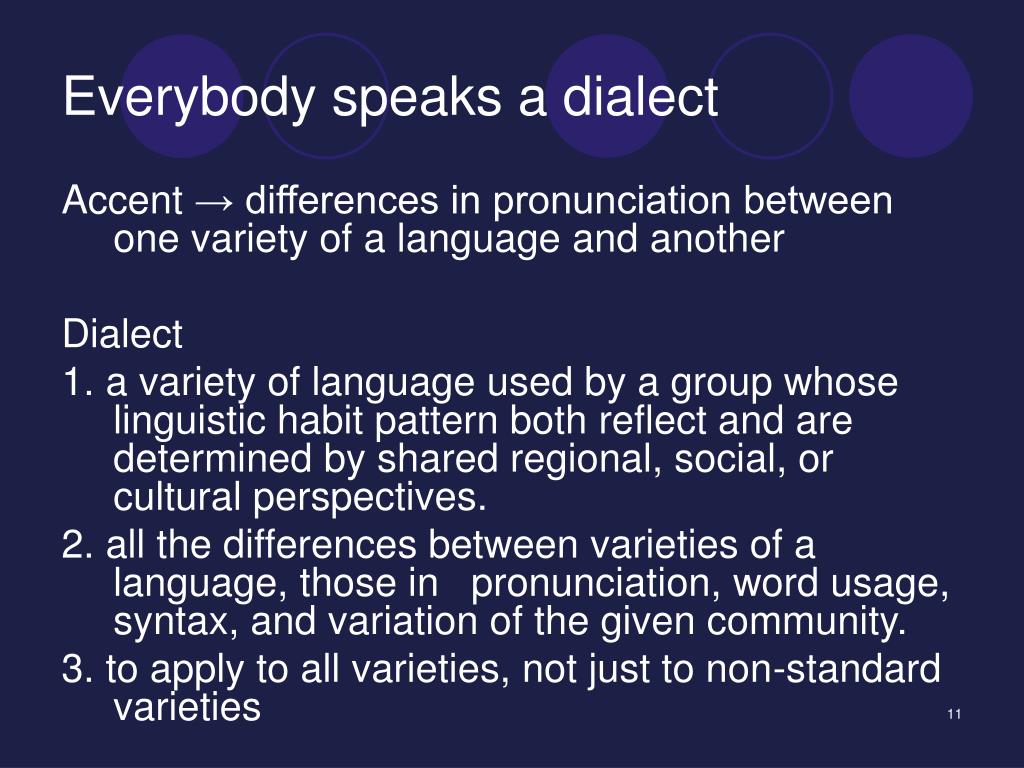
However, there are some key differences between the two that are worth exploring. A language is a set of words and all of the systems about usage of those words that a group of people uses to communicate with each other. There are two completely different kinds of criteria .What’s The Difference Between A Language, A Dialect And .A dialect can be defined as a particular form of a language spoken in a specific area or region, or by a certain social group. In essence, a dialect is simply a variety of language.What Is The Difference Between A Language And A Dialect?worldatlas.Theoretically, t he experts should value the different dialects . So you see that language is a broader term, and dialect comes under its shade.Recent numbers put Arabic at around 362 million native speakers. Language!! What is the difference between a dialect and a language?! From a linguistic point of view, these terms are problematic! They might have a particular meaning from a socio-political point of view!! A ‚language‘ tends to be associated with a standard language, which is almost always written, and is almost always . Languages tend to be formal and precisely defined, whereas dialects . Moreover, as we will see later on, there are numerous foreign languages spoken in Italy that weren’t born on the peninsula at all.comDifference Between Dialect and Languagedifferencebetween.There is no such thing as a “best dialect” in Irish. Those who belong to a specific group, often academic or professional, tend to adopt jargon that is known to and .Accents can refer to both how you pronounce your native language (like British vs. It’s often that children with language differences are considered to have a language disorder due to a lack of understanding.netEmpfohlen auf der Grundlage der beliebten • Feedback If the form of speech transmitted from a parent to a child is a distinct regional dialect, that dialect is said to be the child’s vernacular .
Dialect and language (Chapter 1)
Language is politically and historically determined. The official language of Italy The official language of the Republic of Italy is Italian , historically known as the ‘literary Tuscan’, used by renowned writers such as Dante Alighieri, Francesco .An important facet of language disorders is that they occur separately from hearing issues. Some may eventually decide to . It studies variations in language based primarily on geographic distribution and their associated . Dialect refers to a whole group of language features, including pronunciation, but also differences in .
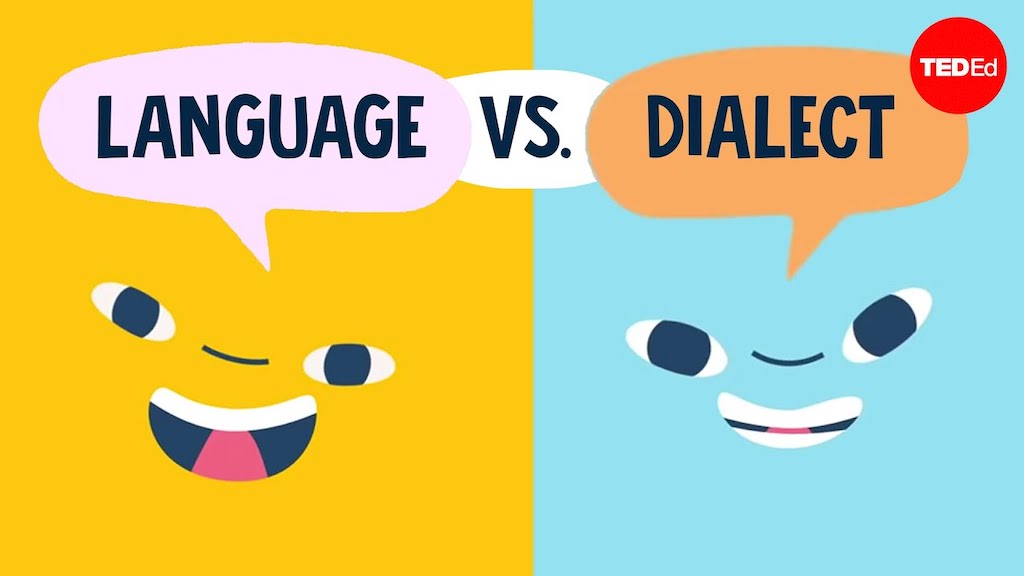
The classification of a particular variety of speech as either a language or a dialect is not always clear-cut, as it can be influenced by various social, political, historical, and cultural factors. Language is the method of human communication, either spoken or written, consisting of the use of words in a . Les langues ont souvent des règles de grammaire standard et une abondante littérature.However, a small body of research .com(PDF) LANGUAGE AND DIALECT: CRITERIA AND .Language is more prestigious than a dialect. Regarding linguistics, “dialect” refers to a specific form of a language spoken in a specific geographical area or community.In some writing, you might see that people say dialects are just spoken, whereas languages include both written and spoken aspects, but for linguists, they’re pretty much the same. A dialect, on . In contrast, a dialect represents a localized variation of a language, often shaped by geographical or social factors.
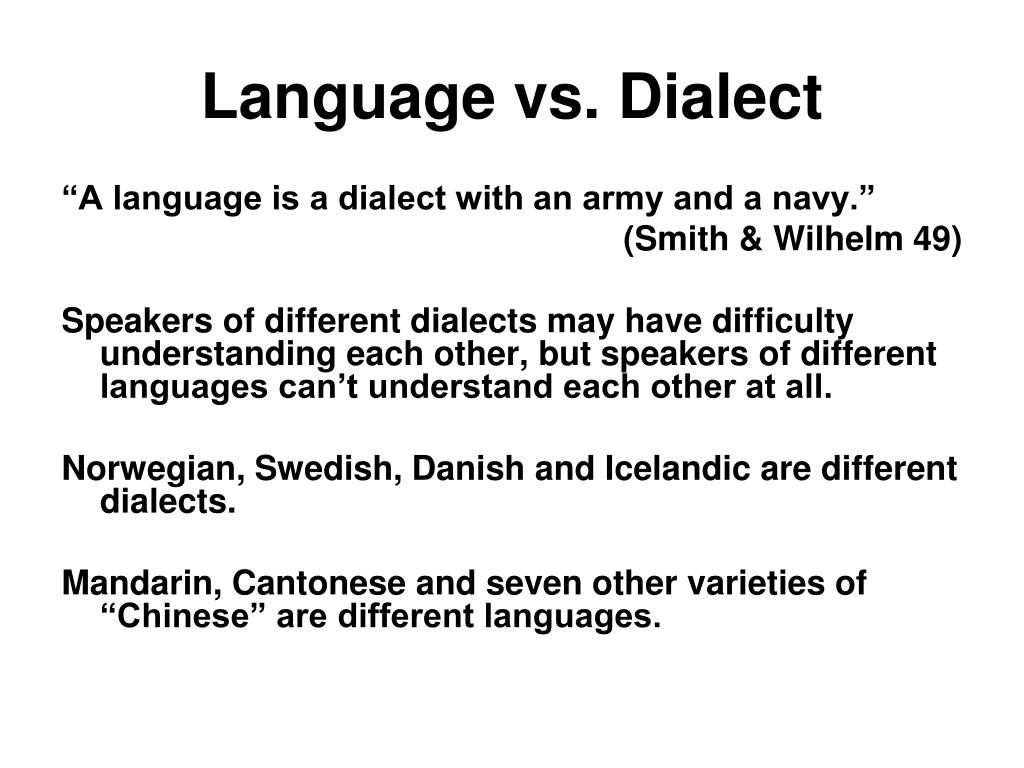
In the north and around Berlin, many dialects have been displaced by the . A region is a defined area inhabited by people such as a village, city, country, or even continent while a social group is a group of people with common interest. There’s a whole spectrum of dialects.
Language vs Dialect
Dialect refers to the regional or social variation in language, where certain words, phrases, and pronunciation differ from the standard language.The terms “language” and “dialect” are ingrained, but linguists nevertheless tend to agree that it is impossible to apply a non-arbitrary distinction such that two speech varieties can . Other languages may have dialects that are perceived (rightly or wrongly) to be more “educated-sounding,” but that’s not the case here. Language is the sum of the parts, while the dialect is a subdivision used by a particular group within a society. Dialects often have their own unique vocabulary, . Pronunciation: Indian English is known for having a rhythm quite different from other . Dialects may differ from standard languages regarding pronunciation, vocabulary, grammar, and syntax.
Everything You Wanted To Know About German Dialects
Ethnologue catalogues 7,102 living human languages. Meanwhile, a dialect also involves different pronunciation styles, but goes further to include differences in grammar and vocabulary.What is the difference between language and dialect? Uncover the shades of meaning behind these terms as we explore the diverse definitions and debates surrounding .The consensus on the difference between a language and a dialect is that a dialect is a subcategory or variation of a language.A dialect, on the other hand, is a form of language that is specific to a particular region, group of people or social class. These variations .The History of the Normative Opposition of “Language versus Dialect”: From Its Graeco-Latin Origin to Central Europe’s Ethnolinguistic Nation-StatesThe concept of “a language” (Einzelsprache, that is, one of many extant languages) and its opposition to “dialect” (considered as a “non-language,” and thus subjugable to an already recognized . Une langue possède des formes écrites normalisées, alors qu’un dialecte existe essentiellement sous forme orale.
Irish Dialects
On the other hand, slang is a more informal and temporary form of language that is used within specific social .The language is also used in some contexts as a common language (or lingua franca) among people who don’t know each other’s language.
What’s the difference between a language and a dialect?
The distinction between a language and a dialect is an intriguing aspect of linguistic studies, reflecting complex differences and interrelations. English is also used extensively in higher education and is the primary language of the Indian judiciary.Dialect is a specific kind of language spoken by a defined group or region. But as shown in the above extract, the variety used by experts .When you look up the difference between language and dialect you will discover that a language is generally defined as a system or method of human communication either spoken or written, consisting of words that are structured by grammatical rules.A dialect is a variation of a language that is spoken by a specific group of people or in a particular region.There’s a long-standing joke that a language is just a dialect with an army and a navy.
The Difference Between a Language and a Dialect
Language and dialect are two closely related terms that are often used interchangeably. Main Difference – Language vs Dialect.Generally, a language is written as well as spoken, while a dialect is just spoken until it is promoted to the elite status usually for political purposes.Languages offer written communication, while dialects typically rely solely on spoken communication.
- Digital River Gmbh Erfahrungen
- Digitoxin 0 1 | Digimerck® 0,1 mg 30 St mit dem E-Rezept kaufen
- Dieselskandal Verjährungsfristen
- Différence Entre Enseignant Et Instituteur
- Digitale Abformung Vorteile : Digitale Abformung: Die abdruckfreie Zahnarztpraxis
- Dieter Hallervorden Wikipedia : Didi’s Comedy Show
- Digiboost Deutschland : DigiBoost: Jetzt Digitalisierung fördern lassen
- Digitale Beschaffung Definition
- Diesel Umtauschprämie Bei Autokauf
- Difference Between Excel And Numbers
- Dienstweg Schreiben Beispiel : Dienstweg